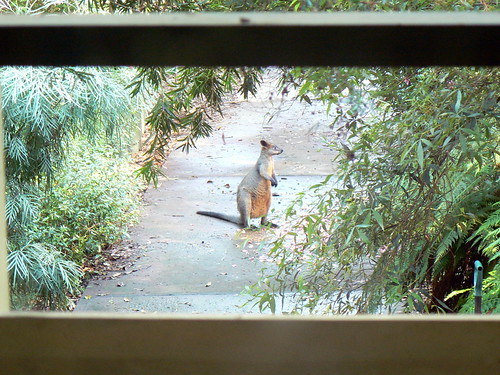Another garden visitor, but one far more common than last post's diamond python. This is a swamp wallaby, Wallabia bicolor.
I took this photo from my study, overlooking the driveway. By the look of her, she's carrying a joey in her pouch.
Swamp wallabies are found throughout the east coast of Australia, their range extending around the coast to south-western Victoria. Their conservation status is secure, but they are less prevalent than they were, due to loss of habitat. They prefer dense forest undergrowth or sandstone heath.
They are the only species in their genus, it being suggested that they diverged from the genus Macropus some 6 million years ago. Unlike other wallabies, this species tends to eat small bushes and shrubs, rather than simply grazing on grasses. This, of course, is why my garden currently resembles a plastic tree-guard plantation. It's an ongoing battle to get my plants large enough to escape the wallabies' predations!
They breed throughout the year, often suckling an older joey while another is still in the pouch. Their gestation period is around 35 days, and the pouch period another nine months. Swamp wallabies grow to 66-85 cm in height, plus about the same length of tail, and weigh 13-17 kilos as adults.

5 comments:
Do you ever take the wildlife around you for granted? To me it's amazing to have wallabies and pythons in your garden. Maybe because I'm from the U.S.A! Still it had to be an amazing sight. To not only have an adult but to a mother and her joey too cool.
Hi Charles,
No, I can honestly say I don't take it for granted. And I feel the same way about the plants that grow wild in our garden--terrestrial orchids, Persoonia, Xanthorrhoea, Eucalypt, Acacia, Banksia.... And the fungi and mosses and lichens.... Every day I look at something in garden, and feel a sense of grace and contentment. Probably sounds really corny, but it's true!
Margaret,
I feel the same way! You don't sound corny at all.
Charles
Margaret,
I've just found your blog. Love the picture of the swampy. I'm looking for more information about these creatures and would love to contact you via email. Any way to do that?
Thanks!
Jody
Hi Jody. Glad you like the blog!
You can reach me at monocotyledon at gmail dot com.
Post a Comment